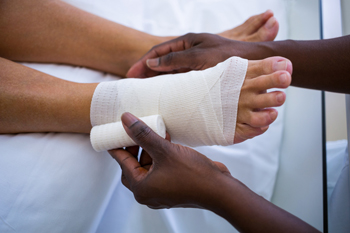1648 US Highway 130
North Brunswick, NJ 08902
 If a wound has developed on your foot, it’s extremely important that you identify which kind of wound it is and take the necessary steps to ensure it heals safely and properly. Oftentimes, wounds go unnoticed on the feet, which is why you should check them daily for any abnormalities. Some common types of wounds that can form include scrapes, abrasions, cuts, or puncture wounds. To care for your wounds, you should begin by washing the affected area with soap and water, followed by thoroughly drying the feet. An antibiotic ointment should then be applied, followed by fully covering the wound. If you find the damaged area has not stopped bleeding after a few hours, professional help should be sought, as stitches may be required. If you also experience redness, swelling, pain, drainage from the wound, or develop a fever, you should seek professional care, as this may be signs that the wound has become infected. In order to safely treat any wounds of the feet, consult with a podiatrist for professional care and an advised plan of action.
If a wound has developed on your foot, it’s extremely important that you identify which kind of wound it is and take the necessary steps to ensure it heals safely and properly. Oftentimes, wounds go unnoticed on the feet, which is why you should check them daily for any abnormalities. Some common types of wounds that can form include scrapes, abrasions, cuts, or puncture wounds. To care for your wounds, you should begin by washing the affected area with soap and water, followed by thoroughly drying the feet. An antibiotic ointment should then be applied, followed by fully covering the wound. If you find the damaged area has not stopped bleeding after a few hours, professional help should be sought, as stitches may be required. If you also experience redness, swelling, pain, drainage from the wound, or develop a fever, you should seek professional care, as this may be signs that the wound has become infected. In order to safely treat any wounds of the feet, consult with a podiatrist for professional care and an advised plan of action.
Wound care is an important part in dealing with diabetes. If you have diabetes and a foot wound or would like more information about wound care for diabetics, consult with Dr. Robert Fink from Brunswick Foot & Ankle Group. Our doctor will assess your condition and provide you with quality foot and ankle treatment.
What Is Wound Care?
Wound care is the practice of taking proper care of a wound. This can range from the smallest to the largest of wounds. While everyone can benefit from proper wound care, it is much more important for diabetics. Diabetics often suffer from poor blood circulation which causes wounds to heal much slower than they would in a non-diabetic.
What Is the Importance of Wound Care?
While it may not seem apparent with small ulcers on the foot, for diabetics, any size ulcer can become infected. Diabetics often also suffer from neuropathy, or nerve loss. This means they might not even feel when they have an ulcer on their foot. If the wound becomes severely infected, amputation may be necessary. Therefore, it is of the upmost importance to properly care for any and all foot wounds.
How to Care for Wounds
The best way to care for foot wounds is to prevent them. For diabetics, this means daily inspections of the feet for any signs of abnormalities or ulcers. It is also recommended to see a podiatrist several times a year for a foot inspection. If you do have an ulcer, run the wound under water to clear dirt from the wound; then apply antibiotic ointment to the wound and cover with a bandage. Bandages should be changed daily and keeping pressure off the wound is smart. It is advised to see a podiatrist, who can keep an eye on it.
If you have any questions, please feel free to contact our office located in North Brunswick, NJ . We offer the newest diagnostic and treatment technologies for all your foot care needs.